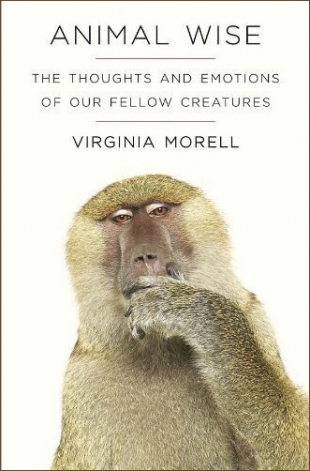"Animals have minds. They have brains, and use them, as we do: for experiencing the world, for thinking and feeling, and for solving the problems of life every creature faces. Like us, they have personalities, moods, and emotions; they laugh and they play. Some show grief and empathy and are self-aware and very likely conscious of their actions and intents.
"Not so long ago, I would have hedged these statements, because the prevailing notion held that animals are more like zombies or robotic machines, capable of responding with only simple, reflexive behaviors. And indeed there are still researchers who insist that animals are moving through life like the half dead, but they're so . . . 1950s. They've been left behind as a flood of new research from biologists, animal behaviorists, evolutionary and ecological biologists, comparative psychologists, cognitive ethologists, and neuroscientists sweeps away old ideas that block the exploration of animal minds. The question now is not 'Do animals think?' It's 'How and what do they think?'
"Hardly a week goes by that doesn't see a study announcing a new discovery about animal minds: 'Whales Have Accents and Regional Dialects,' 'Fish Use Tools,' 'Squirrels Adopt Orphans,' 'Honeybees Make Plans,' 'Sheep Don't Forget a Face,' 'Rats Feel Each Other's Pain,' 'Elephants See Themselves in Mirrors,' 'Crows Able to Invent Tools,' and (for me, as a dog lover, a favorite) 'Dog Has Vocabulary of 1,022 Words.'
"How do scientists know that a dog has such an impressive vocabulary, that moths remember they were once caterpillars, that blue jays regard other jays as thieves, or that not only whales but cows, too, have regional accents? How can we prove that animals think? Once we have done so, what does that tell us about our relationships with them, and what does it tell us about ourselves?
"Many of us have had some experience — playing with a pet or watching wildlife — that made us think an animal was planning something, or feeling joyful or sad. My husband and I are sure that our dog smiles, especially when he's playing with us, or when we give him a promised bone, or when we all are reunited after one of our business trips. We laugh with delight to see his joy and say things like 'Look at how happy Buck is. He's really excited about getting his treat.' But is he? Without language, is there any way to rule out what else he might be thinking about? Maybe he just caught a whiff of a squirrel's scent, or some of our old socks, or maybe he's not smiling at all but simply doing his best to imitate an expression he often sees on our faces and perhaps associates with bones or walks but doesn't fathom in the slightest.
"Although, like many pet owners, I've often had the gut feeling that my dog and cats have mental and emotional lives, I've never tried to prove this — I'm a science writer, not a scientist. The only 'proof' I can offer is that my pets' behaviors, activities, and facial expressions all suggest thoughts and emotions. Isn't that one reason, perhaps the main reason, we have pets in our home? We want the company of lively, expressive creatures, beings that can be fun and loving, grumpy and bored, and that relate to and respond to us as only another living being can. In short, we want to be around something more than pet rocks.
"I don't think I've ever met a pet owner who didn't have a story about his or her smart dog or clever cat. Probably we like having smart pets because, like smart people, they're interesting and entertaining. And sometimes our smart pets make us think."
